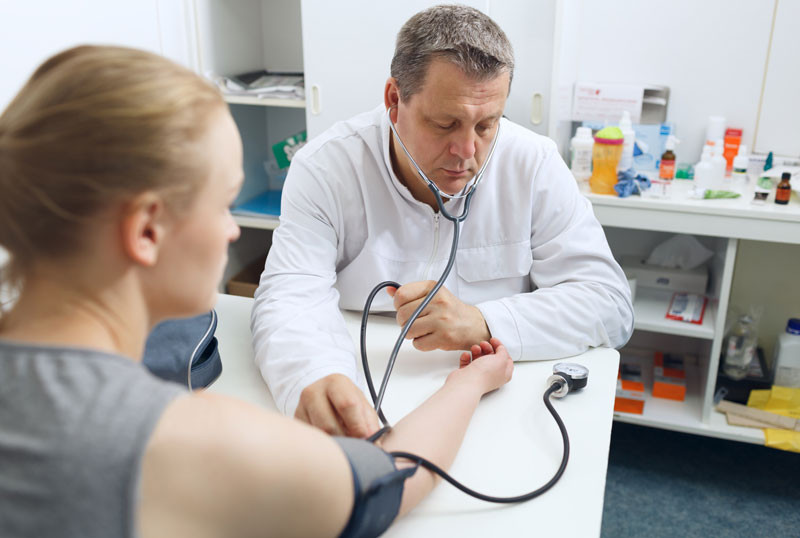It's an old story but one that bears repeating if you want to grow old: high blood pressure, or hypertension, has been called the silent killer because its symptoms are rarely noticeable. However, that is not to say that hypertension is a death sentence. A variety of medications effective in lowering blood pressure (BP) are available. Better yet, there are natural alternatives that have proved useful in reducing BP to healthier levels. A lot of what we can do to help ourselves in the war against hypertension is tasty, too, as in a wide assortment of foods known to have anti-hypertensive qualities. Regular exercise can help as well. So can meditation, stress management, yoga, biofeedback (per healthline.com), and consistently sufficient sleep, although a physician's advice and guidance is always recommended before beginning a new regimen, whether it involve diet, exercise, or something else.
What Is High Blood Pressure?
About one in three Americans are hypertensive, according to the Centers for Disease Control and Prevention (CDC), and the shame of it is that many don't know they have high blood pressure. For many unwitting sufferers, it takes a visit to the doctor, an urgent-care clinic, or a hospital to find out they indeed have high blood pressure. Suddenly they learn that a change to their lifestyle and eating habits are suddenly in order--TODAY. Blood pressure is a measure of the force of blood moving outward from your heart and through your arteries, with the blood pushing against the walls of the arteries, per draxe.com. Every beat of the heart pumps out blood, and there are times when there will be a rise in blood pressure, such as during exercise or moments of high stress. If such elevated BP becomes chronic, the increased pressure can wear down those artery walls, leading to an increased risk of coronary heart disease, stroke, heart attack or even diabetes or kidney damage. It can be scary stuff, especially if you do nothing about it. If and when high BP is detected, a physician typically will, on the spot, write a prescription, or possibly several, designed to lower BP. Still, a hypertensive patient can act over the longer term to help reduce high BP on their own. Carefully monitored exercise such as walking, jogging, swimming, or biking can help, but, as is the case with weight loss, the best plan for attack may be dietary first, cardio workouts second.Eat Your Way to Lower Blood Pressure
A good place to start in reshaping a dietary plan is to follow some general healthful food-prep and eating strategies, such as the following, per draxe.com:- Cook more at home. This entails making your own meals from fresh, nutrient-rich foods and getting processed foods off your plate as much as possible.
- More fiber consumption. Fiber can help lower BP and curb the appetite, which is why it often is recommended for weight-loss programs as well.
- Reduce sodium consumption. Start by getting rid of the salt shaker. High amounts of sodium can affect fluid retention and artery dilation, which aren't good for BP.
- Add potassium to diet. Think green veggies, avocados, bananas, sweet potatoes, etc. Nothing too hard to take there.
- Stay hydrated. Keep drinking water.
- Portion control. Eating the right kinds of foods that can curb appetite can help in that regard.
- Beetroot juice. Its high levels of nitrate can be turned into nitric oxide, which has been shown to reduce BP within hours, per dietvsdisease.org.
- Nuts, namely cashews and almonds. They are full of magnesium – a magnesium deficiency in our bodies can be a factor in elevated BP.
- Kale. Considered a superfood, and this holds true when it comes to healthy BP. Its abundance of healthy nutrients includes both potassium and magnesium.
- Curcumin (turmeric). Like beetroot, mentioned earlier, curcumin contains nitric oxide, which, when processed in the body, can aid in blood flow and pressure.
- Vitamin K2. Studies have linked vitamin K2 to vascular health, per dietvsdisease.org, in that it assists in the removal of calcium buildup in the blood vessels.
- Extra virgin olive oil. Think of it as a great substitute for sodium-rich salad dressings and food-topping sauces. One study found that it can reduce the risk of heart attacks and strokes by 30 percent.
- Fresh fruit. Many are great sources of fiber, potassium, magnesium, and antioxidants.
- Cinnamon. Studies have shown it especially helpful for lowering BP in diabetics, per livestrong.com.

